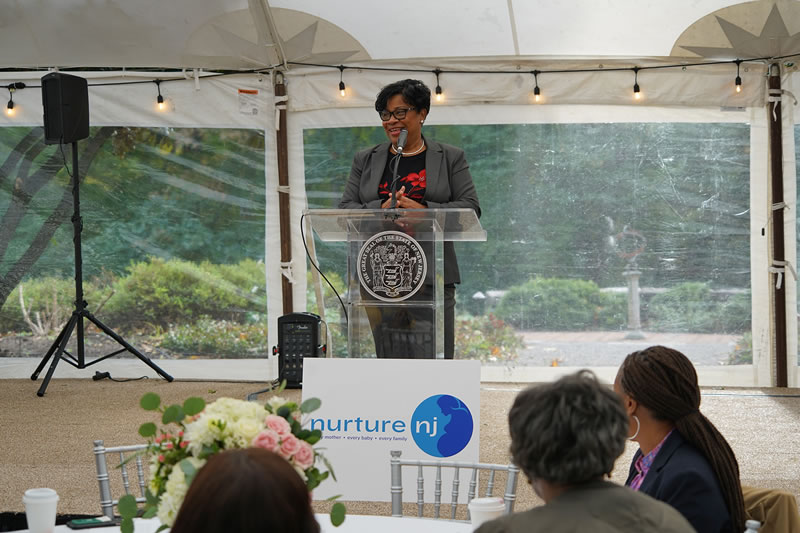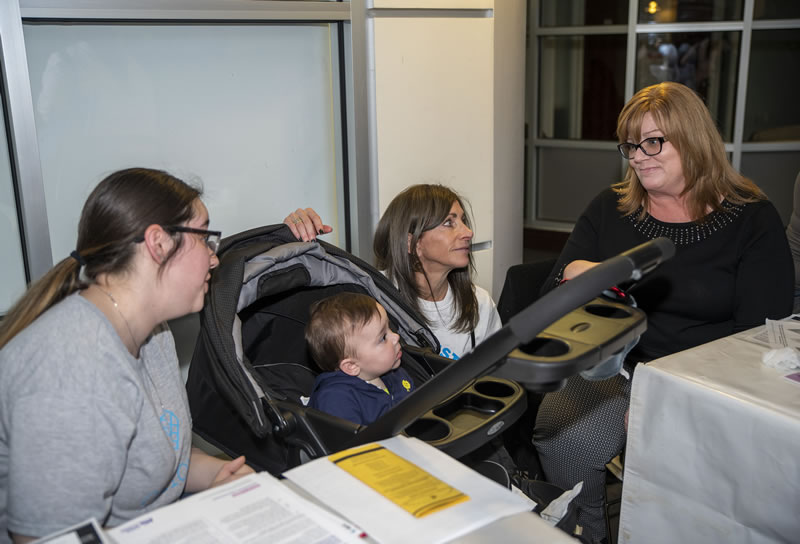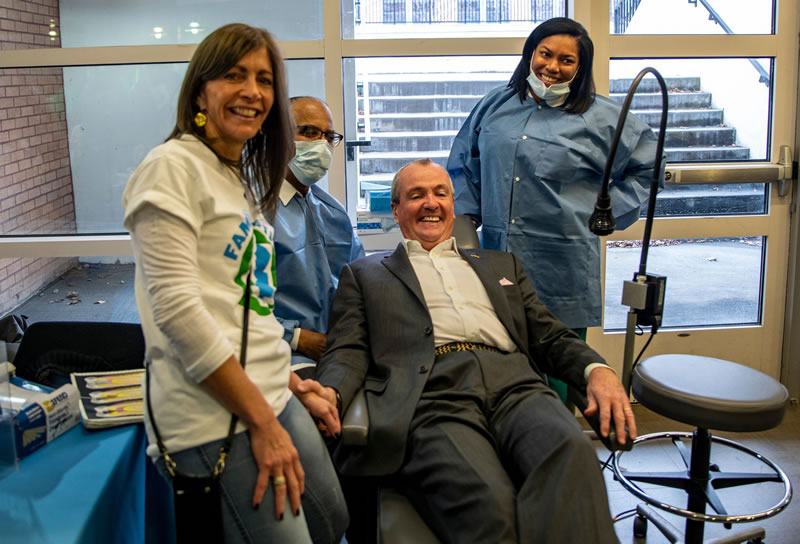State Departments & Agencies
Thank you for joining us as we work toward achieving Nurture NJ’s mission to make New Jersey the safest, most equitable place in the nation to deliver and raise a baby. On this page, you will be able to find the recommended activities and associated resources to aid you and your fellow state departments and agencies along the way in implementing the plan.
Click on the STEP below that represents where you are in the process of supporting Nurture NJ.
- If you are just beginning, click on Step-1.
- If you have been implementing your NNJ action areas for more than three months, click on Step-2.
- If you are more than six months into implementation, click on Step-3.
- Finally, if you have been working on Nurture NJ initiatives for more than nine months, click on Step-4.
These recommendations apply to you if you are one of the following:
- Government Agencies
- Contractors
We are thrilled to work in community with you. Welcome aboard!
All state departments and agencies should be required to issue written statements of their commitment to community engagement.
Activities to begin in support of 2.2
- Where appropriate, state departments and agencies should begin assessing the populations and communities their programs impact most directly, identify gaps and existing ways in which departments and agencies currently engage those communities.
- Where gaps are found, state departments and agencies should update policies and procedures to incorporate high-level community engagement.
Tools, Resources
- I.4, Nurture NJ Resource Guide, Section II
- Nurture NJ Strategic Plan Companion Document: A Deeper Dive into Data and Key Concepts. Article:
- II.5, Community Engagement, Power-Building and Power-Sharing
- III.2, Community Power-Building and Ownership Diagram
- IV.3, PRISM E Equity Implementation Model
- III.3, IAP2 Community Engagement Typologies
Models:
https://www.bangthetable.com/category/case-studies/
https://news.wsu.edu/2015/01/07/wsu-recognized-for-commitment-to-community-engagement/ This website describes numerous case studies on the conduct of community engagement using digital engagement media.
Develop permanent structures to integrate community partnership into state, county, and local decision-making processes.
Activities to begin in support of 2.3
- Ensure department and agency leadership understand the impacts of racism on health; the need for health equity in all policies; and the importance of community engagement in policy and program development.
Tools, Resources
- II.1, Colorado Health Equity Assessment Tool
- II.2, Assessing Organizational Racial Justice
- Nurture NJ Strategic Plan Companion Document: A Deeper Dive into Data and Key Concepts. Article:
- II.5, Community Engagement, Power-Building and Power-Sharing
- III.2 Community Power-Building and Ownership Diagram
- IV.3 PRISM- E Equity Implementation Model
- III.1 Community Engagement Typologies
Models
https://www.bangthetable.com/category/case-studies/
https://news.wsu.edu/2015/01/07/wsu-recognized-for-commitment-to-community-engagement/ This website describes numerous case studies on the conduct of community engagement using digital engagement media. Digital engagement is essential amid a pandemic such as COVID-19.
Reframe the statewide targets in Healthy New Jersey 2030.
Activities to begin in support of 4.8
- The Department of Health should align its 2030 targets to promote equity by ensuring equal targets for white and Black infant mortality rates.

The Department of Health should increase the utilization of the Women, Infants and Children (WIC) Program through policy changes and program modernization.
Activities to begin in support of 5.5
- The Department of Health should accelerate plans to provide a benefits card, streamline application approvals, and additional improvements developed in consultation with recipients and community stakeholders.
- The Department of Health should closely examine adjustments made during COVID-19 (e.g., application/approvals via phone, the substitution of additional food items) for permanent integration as federal and state laws allow.
- Integrate WIC outreach into the Central Intake process, including those contacts initiated by phone and text message.
Expand successful programs that improve access to high-quality education.
Activities to begin in support of 5.2
- The Secretary of Higher Education should expand existing partnerships with community colleges, four-year institutions, and technical and vocational schools to tailor programming to accommodate women of childbearing age seeking to complete their degrees, gain a trade, or pursue a vocation.
- The Office of the Secretary of Higher Education should continue to expand successful outreach and awareness programs for women to increase participation in existing programs, including New Jersey’s tuition-free Community College Opportunity Grant (CCOG) program, the federal GEAR UP (Gaining Early Awareness and Readiness for Undergraduate Programs) grant administered by the state, and New Jersey’s Educational Opportunity Fund (EOF), including marketing with a focus on women of childbearing age and women of color.
- The Office of the Secretary of Higher Education should publish a material hardships guide for institutions of higher education, with a particular focus on resources for student parents.
The Department of Treasury should increase uptake of the Earned Income Tax Credit.
Activities to begin in support of 5.3
- Working with community partners, the Department of Treasury should continue and expand outreach and a trust-building program for taxpayers and employers to ensure that all individuals eligible for the Earned Income Tax Credit are accessing the benefit.

The Department of Labor should continue its efforts with employees and employers to expand utilization of the paid family leave benefits.
Activities to begin in support of 5.4
- Conduct outreach to large and small employers, as well as to employees directly, ensuring awareness of the benefits and encouraging uptake.
- Develop consumer-friendly materials that explain the health and economic benefits of paid family leave.
The state should continue to invest in opportunities for safe, decent, toxin-free affordable housing.
Activities to begin in support of 5.1
- The Department of Health, Department of Human Services, Housing Mortgage and Finance Agency (HMFA) should identify point people for a collaborative process, and begin to map the necessary steps to identify parents with dependent children as a “special needs” category for HMFA projects.
All state departments and agencies should be required to issue written statements of their commitment to community engagement.
Activities to begin in support of 2.2
- State departments and agencies should work to draft statements of commitment to community engagement.
Tools
Nurture NJ Strategic Plan Companion Document: A Deeper Dive into Data and Key Concepts. Article:
- II.3. Building Infrastructure to Support, Promote and Maintain Racial Equity and Community Power-Sharing in all Policies and Processes of Nurture NJ
- II.1, Colorado Health Equity Assessment Tool
- II.2, Assessing Organizational Racial Justice
- IV.3 PRISM E Equity Implementation Model
- III.1 Community Engagement Typologies
Models
https://www.bangthetable.com/category/case-studies/
https://news.wsu.edu/2015/01/07/wsu-recognized-for-commitment-to-community-engagement/ This website describes numerous case studies on the conduct of community engagement using digital engagement media.
The Department of Human Services should strengthen efforts to make the health system accountable to women of color through reliable coverage and evidence-based care.
Activities to begin in support of 5.8
- The Department of Human Services should consider updates to contracts with Medicaid MCOs to improve maternal and infant health, including:
- new standards to ensure evidence-based care for women, including measures for participating providers related to NTSV.
- requirements that plans ensure financial accountability along the continuum of care among hospitals, birthing centers, pediatricians, and community services to ensure a meaningful continuum (not just “warm hand-off”) for first year of a baby’s life; MCO plans should have contractual requirements to secure documented assurance that families are linked to the tools and resources needed to carry out recommended care plans.
The Department of Health should implement a system of community-designed, real-time maternal feedback on quality of care.
Activities to begin in support of 5.10
- The Department of Health should pilot the use of The Mothers on Respect index (MOR) scale post-delivery, with data captured in electronic medical records to facilitate analysis; after the pilot results, the Department should iterate on the model to develop and implement a system of community-designed, real-time maternal feedback on quality of care (in keeping with the statutory requirements of P.L. 2019, c. 75, which created the New Jersey Maternal Care Quality Collaborative).
Tools, Resources and Models
A selection of evaluation tools, including the MOR, is available here. The Mothers on Respect index (MOR) is a scale developed to assess the nature of respectful patient-provider interactions and their impact on a person’s sense of comfort, behavior, and perceptions of racism or discrimination. The MOR index is a reliable, patient-informed quality and safety indicator that can be applied across jurisdictions to assess the nature of provider-patient relationships, and access to person-centered care.

The Department of Health and Department of Human Services should support a representative, effective community workforce serving pregnant individuals and babies.
Activities to begin in support of 5.13
- The Department of Human Services should continue to improve Medicaid reimbursement for all obstetric providers to reach 100 percent of the physician rate, and require MCOs to reimburse for, and include, all members of a perinatal care team (including doulas and community health workers) in their networks.
- The Department of Human Services should carefully review the results of the Center for Medicare and Medicaid Services Strong Start Evaluation for potential activities to expand access for Medicaid beneficiaries to the midwifery model of care.
- The Department of Human Services should clarify that certified midwives are eligible to enroll as providers in the state Medicaid program.
- The Department of Health and Department of Human Services should continue to support the capacity and workforce development of doulas to serve pregnant individuals during the prenatal and post-partum period.
Tools, Resources and Models
- Nurture NJ Strategic Plan Companion Document: A Deeper Dive into Data and Key Concepts, Articles:
- I.1. New Jersey Women Speak: New Jersey Isn’t the Greatest Place to Give Birth Now
- I.2. Maternal Morbidity and Mortality in New Jersey
- I.3. Infant Mortality in New Jersey
- I.4. Data Snapshot: Women’s Access to Healthcare, Social Services, and Supportive Policy.
- 1.5. Issue in Focus: Adverse Childhood Events, Substance Use and Infant and Maternal Morbidity and Mortality
- I.6. Racism in the United States
- I.7. The Science: Pathways of Racism’s Impact on Health
- II.3, Building Infrastructure to Support, Promote and Maintain Racial Equity and Community Power-Sharing in All Policies and Processes of Nurture NJ
- II.1, Colorado Health Equity Assessment Tool
- II.2, Assessing Organizational Racial Justice
- IV.1 Structural Change Process for Nurture NJ
- IV.2 R4P Equity Bundle
Improve the process for quality and usage of state maternal mortality data through significant reinvestment in the Maternal Mortality Review Committee (MMRC).
Activities to begin in support of 6.2
- The Department of Health should leverage federal funding from the Centers for Disease Control and Prevention and from the Health Resources and Services Administration to call more frequent meetings of the MMRC, expand staff, and conduct more thorough investigations.
- The Department of Health should train MMRC members on health equity, implicit bias, antiracism, and other emerging priorities.
Develop multi-sector efforts to address the specific issue of transportation access for women.
Activities to begin in support of 8.3
- The New Jersey Economic Development Authority and other relevant departments and agencies should consider initiatives using rideshare services to provide transportation to doctor appointments, grocery stores, and other services for pregnant mothers and their infants.
- The Department of Transportation should identify Complete Streets policies that can be accelerated and implemented more quickly, with a focus on underserved communities with high rates of maternal and infant mortality.
Develop multi-sector efforts to address the specific issue of women impacted by the criminal justice system.
Activities to begin in support of 8.6
- The Department of Corrections and its contractors should assess costs for a program to provide pregnancy and childbirth education for all incarcerated parents and seek public-private partnerships as necessary.
Continue to improve and transform Central Intake.
Activities to begin in support of 7.17
- The Department for Children and Families and the Department of Health should work together to streamline and upgrade Central Intake to improve access to services, including expanded hours to accommodate family schedules, and changing the program’s name to increase approachability.
- Building from the “Calling all Sectors” project, agencies should continue to make Central Intake multi-sectoral in each community. Central Intake grantees should expand training for staff on the available programs and facilitate stronger partnerships with local community programs providing services to families, ensuring that each grantee facilitates access to other vital services, operating as a “Nurture NJ Navigator.”
- The Department of Health, the Department for Children and Families, and the Department of Human Services should create formal linkages between Central Intake programs and Medicaid Managed Care Organizations to provide services to their members in communities.
The Department of Human Services and Department of Health should work together to improve accountability to women of color through data transparency.
Activities to Begin in Support of 6.3
The Department of Health and Department of Human Services should formalize a plan for centralizing data on maternal and infant health and service access irrespective of payer.
Tools, Resources and Models
Nurture NJ Strategic Plan Companion Document: A Deeper Dive into Data and Key Concepts. Articles: Section III. Equity Evaluation Framework for the Nurture NJ Strategic Plan
- Section III. Equity Evaluation Framework for the Nurture NJ Strategic Plan
- I.2, Maternal Morbidity and Mortality in New Jersey.
- I.3, Infant Mortality in New Jersey.
- I.4, Data Snapshot: Women’s Access to Healthcare, Social Services, and Supportive Policy.
Craft and disseminate an “advised procedure” for how county prosecutors work with pregnant women, including the possibility of delaying sentencing for the period of pregnancy and three months postpartum.
Activities to Begin in Support of 7.17
- State leaders, including the Office of the Attorney General, Department of Corrections, and Department of Health should collaborate on the development of the new procedures and practices.

Continue to expand and strengthen Fatherhood Engagement Initiatives.
Activities to Begin in Support of 7.17
- The Department of Children and Families and the Department of Health should conduct community-led assessment of existing fatherhood engagement programs to glean best practices.
- The Department of Children and Families and the Department of Health should encourage grantees of fatherhood programs to include fathers in the leadership of the initiatives.
The New Jersey Economic Development Authority should provide targeted support to childcare providers as a critical industry in the state.
Activities to Begin in Support of 5.22
- Work with state leaders to create a program through the Small Business Fund that supports community-based childcare.
- Begin plans to support shared services for existing childcare providers.
The Department of Health and Department of Human Services should support a representative, effective community workforce serving pregnant individuals and babies.
Activities to Begin in Support of 5.13
- The Department of Human Services should consider the results of CMS’ Strong Start Evaluation, with a focus on Birth Centers and targeted Group Prenatal Care, for potential adoption in New Jersey.
Tools, Resources and Models
- https://www.midwife.org/acnm/files/cclibraryfiles/filename/000000007531/ EssentialFactsAboutMidwives-UPDATED.pdf. This document describes some key facts about midwifery practice in the US.
- Published Article: Jolles, D. R., Allman, J. & Stapleton, S. R. Strong Start for Mothers and Newborns: Moving Birth Centers to Scale in the US. https://onlinelibrary.wiley.com/doi/pdf/10.1111/birt.12430
- Strong Start Findings At-A-Glance. https://innovation.cmsgov/Files/reports/ strongstart-prenatal-fg-finalevalrpt.pdf An infographic that summarizes some key findings from the Strong Start study.
- Strong Start evaluation Vol. 1: https://downloads.cms.gov/files/cmmi/strongstart-prenatal-finalevalrpt-v1.pdf (see the Executive Summary at pp 11-18)
- Strong Start Evaluation, Vol. 2: https://downloads.cms.gov/files/cmmi/strongstart-prenatal-finalevalrpt-v2.pdf
- https://www.thelancet.com/journals/lancet/article/PIIS0140-6736(14)60789-3/full. This link provides several articles on the midwifery model of care.
The Department of Banking and Insurance should continue its outreach to pregnant women.
Activities to Begin in Support of 9.7
- The Department of Banking and Insurance should ensure proactive outreach to relevant communities to notify them that as of February 1, 2021, pregnancy will be a qualifying event to enroll in coverage through the state-based marketplace outside of annual enrollment periods.
The Department of Education should continue to prioritize access to high-quality, affordable childcare through programs such as Early Head Start.
Activities to begin in support of 5.20
- Evaluate programs and policies, for accessing high-quality, affordable childcare in infant mortality hotspots.
- Support community outreach efforts to ensure full usage.
Continue to develop and implement the perinatal episode of care as a model design opportunity.
Activities to Begin in Support of 5.11
- Nine months into the implementation of the Nurture NJ Strategic Plan, the Department of Human Services should assess the status of its development of a perinatal episode of care model in Medicaid and identify any administrative or legislative remedies necessary.
